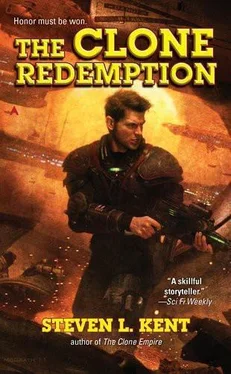Steven Kent - The Clone Redemption
Здесь есть возможность читать онлайн «Steven Kent - The Clone Redemption» весь текст электронной книги совершенно бесплатно (целиком полную версию без сокращений). В некоторых случаях можно слушать аудио, скачать через торрент в формате fb2 и присутствует краткое содержание. Жанр: Боевая фантастика, на английском языке. Описание произведения, (предисловие) а так же отзывы посетителей доступны на портале библиотеки ЛибКат.
- Название:The Clone Redemption
- Автор:
- Жанр:
- Год:неизвестен
- ISBN:нет данных
- Рейтинг книги:4 / 5. Голосов: 1
-
Избранное:Добавить в избранное
- Отзывы:
-
Ваша оценка:
- 80
- 1
- 2
- 3
- 4
- 5
The Clone Redemption: краткое содержание, описание и аннотация
Предлагаем к чтению аннотацию, описание, краткое содержание или предисловие (зависит от того, что написал сам автор книги «The Clone Redemption»). Если вы не нашли необходимую информацию о книге — напишите в комментариях, мы постараемся отыскать её.
The Clone Redemption — читать онлайн бесплатно полную книгу (весь текст) целиком
Ниже представлен текст книги, разбитый по страницам. Система сохранения места последней прочитанной страницы, позволяет с удобством читать онлайн бесплатно книгу «The Clone Redemption», без необходимости каждый раз заново искать на чём Вы остановились. Поставьте закладку, и сможете в любой момент перейти на страницу, на которой закончили чтение.
Интервал:
Закладка:
The Jackal darted ahead of him, skidding around trees without coming to a stop. Fire flashed from the machine gun in the turret. He should have dived for cover, but Ritz fired another RPG instead, hitting the Jackal above the rear tires. Had it not been for the shields, the Jackal would have exploded. Even with the shields, the percussion of Ritz’s grenade knocked the Jackal for a loop. It spun like a dog chasing its own tail, slid down a rise, and disappeared into the shadows.
“That’s two up your ass,” Ritz screamed as he panted. Then, more quietly, he added, “I got more where that came from.”
He stumbled up a rise. As he ran down the other side, he was surrounded by Marines. He had rejoined us.
“General,” he said over the interLink, fighting to breathe, “General Harris.”
“Colonel,” I said. I did not want him to know I’d been spying on him, so I asked, “Were you able to locate a Jackal?”
“Yes, sir,” he said as he panted. “I took two men with me. We hit it three or four times.”
“Did you destroy it?”
“We couldn’t get past the shields,” he said.
“Good to know,” I said. “Thank you, Colonel.”
Their fighters could have annihilated us. We could not penetrate the shields on their light-armored vehicles. They were using us to test their equipment, and all that remained to be tested was their troops.
CHAPTER FIFTY-SIX
We’d been on the ground for nearly four hours when we reached the municipal spaceport. We came out from the trees, and there it was—a chain-link-wrapped clearing that ran as far as I could see. It sat as flat as a pond and as wide as the plains.
The twenty-foot fence that ran its length posed no challenge. When one of my officers asked if I thought it was electrified, I answered, “Doesn’t matter.”
I pulled the particle-beam pistol from my belt, and shouted, “Stand clear” as I fired at the nearest post. The emerald green beam did not heat or burn the metal post, the beam disrupted it, leaving molten splinters in its place. I aimed at the chain link. It tore like a spiderweb.
Beyond the fence, the spaceport was a patchwork of shadows. The ground was black and smooth like a lake on a dark, still night. No light shone in the windows of the terminal building, but the reflection of the moonlight showed on the glass.
“They’re specking with us, aren’t they, sir?” Ritz asked.
“Colonel,” I said, “they are playing with us the way a misguided feline plays with a rabid mouse. They have no idea what we have in store for them.” I wanted to sound confident, but probably sounded deluded.
I switched frequencies, and said, “Ray, we’re just about at the end of the line here.”
Freeman said, “I was wondering when you’d call.”
“Where are you?” I asked.
“I’ve set two of the detonators.”
“They never found them?” I asked. When Freeman didn’t answer, I mumbled the answer for him, “Apparently not.” Then I said, “I hope you get to the third one fast, the bastards have us bottled in a spaceport.”
Freeman said, “Shouldn’t be long.”
“Let me know,” I said.
“You’ll be the second person to know,” Freeman said, and he signed off. He meant that he would signal Don Cutter first.
The Unifieds had chosen a battlefield designed around our defense. We had long-range weapons, M27s, snipers, and grenadiers with rockets; but we needed cover. Their short-range weapons would not work until they reached the spaceport, a man-made butte in the middle of an asphalt desert. The spaceport was a massive building surrounded by runways, open fields, and parking lots. In that building, we’d have cover.
They would not switch on their shields until they strolled within range of our snipers. The Unifieds knew how long their batteries lasted. The power would spike every time we hit the shields. If we hit them with a steady stream of bullets, the armor might wear out in eight minutes; but that required continuous attack.
If we stalled their charge …if we could keep them from entering the spaceport for forty-five minutes, their armor would run out of power. The fléchette guns on their armor were great short-range weapons; but once the batteries ran out on their shields, the enemy would be as vulnerable as us.
So many variables. Could we slow them down? What would they do if we took control of the battle? Would they send in tanks and fighters? And then there was Freeman—the man was always a wild card. If he managed to shut down the missile defense …how long would Cutter need to send in reinforcements?
We crossed the runway. Three-foot-tall posts with lanterns rose like cattails out of the tarmac, but the lights remained out. Dressed in dark green armor, my men looked like shadows in the night. They crossed the ground in fire teams and formations, guns ready, moving quickly and covering their flanks.
If the Unifieds caught us crossing the runway, we’d have no place to hide and absolutely no cover. They would have mowed us down. We were twenty thousand men, out in the open, with no place to hide; but the cocky bastards did not want to squander the opportunity to test their soldiers. They wanted to give their ground troops live targets and hand-tohand combat experience. They would let us reach the building and dig ourselves in. What did it matter to them?
The second and third stories of the terminal had walls made of thick glass. Those were the passenger areas. The Unifieds did not squander taxpayer dollars on the ground floor, the service area used by luggage handlers and mechanics. That floor had cement walls and metal doors.
The first of my Marines entered the terminal building. A fire team opened a side door and tossed in a flash grenade. The phosphorous light blazed like a flash of silver-white, like a sheet of lightning that did not fade for nearly a minute.
I watched as teams scrambled into the building. Silver-white glare lit up the windows as teams reached the second floor. The building was empty. Not a shot was fired.
“We’ve entered the building, sir, and we have not encountered enemy resistance,” one of my colonels reported. “A bit too easy if you ask me.”
Another genius of the officer corps, I thought. “Yes, it’s almost like they wanted us to take the building,” I said in a mechanical voice.
I surveyed the building from the runway. “Break the windows,” I said. “Riflemen and automatic riflemen on the second floor. Grenadiers on the third. Snipers on the roof.”
I’d done all of this before, and I knew how it would work. You can only slow an enemy who has something to fear. Our bullets would not hurt these men. The blasts from our rockets might knock them over, but they would resume their attack unhurt. They had nothing to fear, and they would cross the runway in five minutes flat.
That would leave them with forty minutes to sweep the terminal building. Under normal circumstances, capturing a building the size of a spaceport could take days; but that was against an enemy who could injure your men. Again, with that damned shielded armor, the Unifieds could throw cautionary procedures to the wind. They could storm up the stairs and run through the halls. Tactical maneuvers be damned, they could walk right into our fire.
Glass shattered above my head as I reached the building. A blizzard of shards and slivers poured down and shattered behind me. I didn’t worry about getting cut, my armor would protect me from falling glass. Fléchettes were another story.
The ground level of the terminal building was little more than a garage, a cavernous empty space with an oil-stained cement floor. A fleet of electric carts sat in a line along one of the walls. I saw conveyor belts for moving luggage, security posts, and a bumper crop of stairwells and service elevators.
Читать дальшеИнтервал:
Закладка:
Похожие книги на «The Clone Redemption»
Представляем Вашему вниманию похожие книги на «The Clone Redemption» списком для выбора. Мы отобрали схожую по названию и смыслу литературу в надежде предоставить читателям больше вариантов отыскать новые, интересные, ещё непрочитанные произведения.
Обсуждение, отзывы о книге «The Clone Redemption» и просто собственные мнения читателей. Оставьте ваши комментарии, напишите, что Вы думаете о произведении, его смысле или главных героях. Укажите что конкретно понравилось, а что нет, и почему Вы так считаете.












